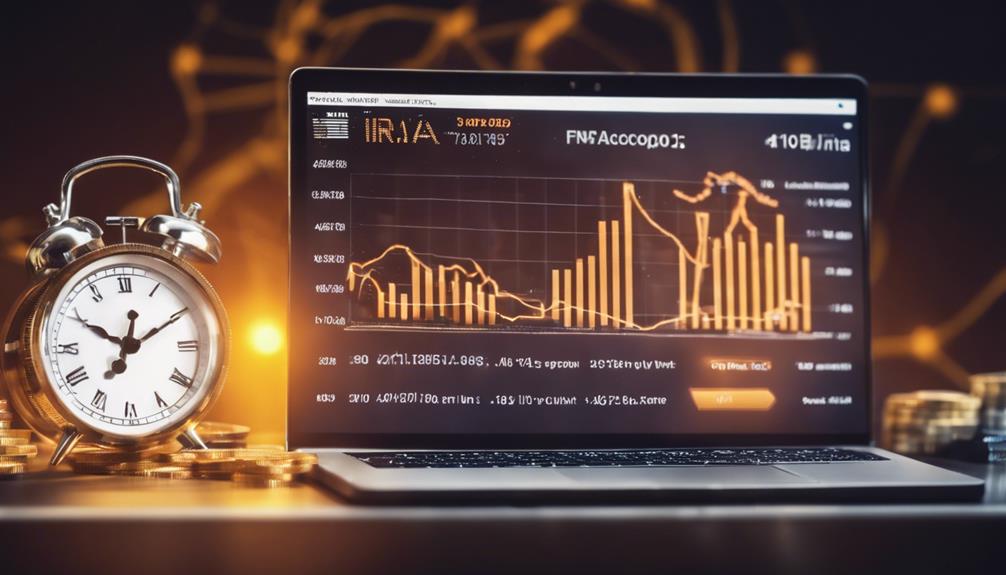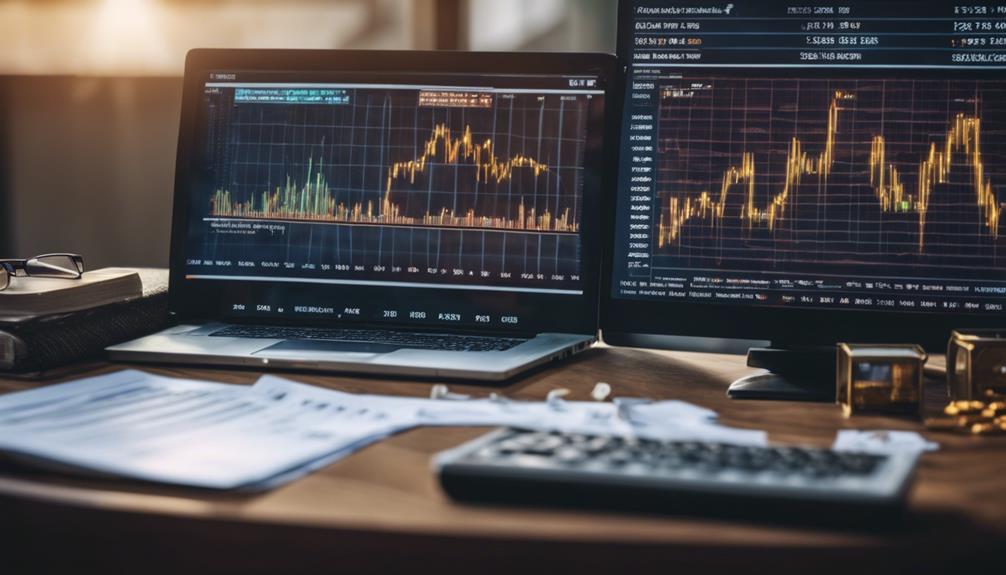To buy Bitcoin for your IRA, establish a self-directed IRA with a specialized custodian like iTrustCapital. Confirm the custodian's experience in handling cryptocurrencies and understand IRS regulations. Choose a reputable custodian such as BitIRA for Bitcoin investments. Fund your Bitcoin IRA within contribution limits, considering tax implications. Follow IRS guidelines for effective retirement savings. Monitor performance, manage risks, and stay informed on market trends. Setting up alerts helps respond promptly to changes. Review investment strategy to align with financial goals. Seek guidance on rebalancing your portfolio. Be aware of tax implications, risks, and regulatory requirements for Bitcoin IRAs. Understanding these steps will help optimize your retirement portfolio further.
Key Takeaways
- Open a self-directed IRA with a custodian supporting Bitcoin investments.
- Fund the IRA through contributions, transfers, or rollovers.
- Choose a reputable IRA company specializing in cryptocurrency.
- Understand tax implications for potential advantages.
- Adhere to IRS regulations and contribution limits for compliance.
Establishing a Self-Directed IRA

To establish a self-directed IRA for investing in alternative assets like Bitcoin, individuals can choose specialized custodians or trustees that offer this investment option. Self-directed IRAs provide investors with the flexibility to diversify their retirement portfolios beyond traditional assets. When considering Bitcoin as an investment within an IRA, it is important to understand IRS regulations and contribution limits that govern these accounts. By utilizing the services of specialized custodians or trustees such as iTrustCapital or BitcoinIRA, investors can navigate the intricacies of holding Bitcoin within a retirement account.
Investing in Bitcoin through a self-directed IRA requires a thorough understanding of the risks and benefits associated with this alternative asset. While these accounts offer greater control over investment choices, they also come with regulatory considerations that must be adhered to. By working with custodians or trustees experienced in handling alternative assets like Bitcoin, investors can guarantee compliance with IRS guidelines while exploring the potential growth opportunities that cryptocurrency investments may offer within a tax-advantaged retirement account.
Finding a Cryptocurrency-Friendly Custodian

When seeking a custodian for your self-directed IRA to facilitate cryptocurrency investments like Bitcoin, consider reputable companies such as BitIRA, Equity Trust, and Bitcoin IRA. These custodians specialize in supporting digital assets within IRAs and offer services for the purchase and storage of Bitcoin. It is essential to verify that the chosen custodian has the necessary experience and expertise in handling cryptocurrencies to safeguard your investments effectively.
Before finalizing your decision, check for any specific fees or requirements associated with holding Bitcoin in an IRA with the custodian. Understanding the fee structure will help you assess the cost-effectiveness of using their services for your Bitcoin investments. Additionally, research the reputation and regulatory compliance of the custodian to guarantee the security and legality of your cryptocurrency holdings.
Funding Your IRA for Bitcoin Investment

When considering funding your IRA for Bitcoin investment, it is crucial to be mindful of:
- IRA contribution limits
- The importance of choosing a reliable custodian
- The tax implications associated with investing in Bitcoin through your retirement account
Understanding these key points will help you make informed decisions and navigate the process of funding your IRA for cryptocurrency investments effectively.
IRA Contribution Limits
Discussing funding options for Bitcoin investments in your IRA, it is essential to understand the annual contribution limits set by the IRS. Here are key points to keep in mind:
- IRA contribution limits for 2021: $6,000 for individuals under 50, $7,000 for those 50 and older.
- Limits can be split between traditional and Roth IRAs.
- Contributions must derive from earned income, not surpassing total taxable compensation.
- Can be made in cash or through transfers from other retirement accounts.
Staying within these limits is vital to avoid penalties and optimize your retirement savings potential. Be sure to adhere to the guidelines to make the most of your IRA for Bitcoin investments.
Choosing a Custodian
Choosing a reputable custodian is an essential step when funding your IRA for Bitcoin investment. Look for a custodian that allows self-directed IRAs to invest in Crypto, specifically Bitcoin, within retirement accounts.
It is vital to make sure the custodian is licensed, regulated, and experienced in handling cryptocurrency investments, offering secure storage solutions for Bitcoin within the IRA. Some custodians may also provide a range of cryptocurrencies beyond Bitcoin for investment options.
Consider the fees associated with the custodian's services, comparing them to align with your investment goals. By selecting a trustworthy custodian with suitable expertise, security measures, and competitive fee structures, you can navigate the complexities of investing in Bitcoin through your IRA effectively.
Tax Implications for Bitcoin
To navigate the tax implications of funding your IRA for Bitcoin investment, it is essential to understand the distinctions between Roth and Traditional IRAs.
- Contributions to a Roth IRA are made with after-tax dollars, while withdrawals are generally tax-free at retirement age.
- Traditional IRA contributions are tax-deductible, but withdrawals are taxed as ordinary income in retirement.
- Bitcoin investments within a Roth IRA can grow tax-free, providing potential for significant long-term wealth accumulation.
- Funding your IRA for Bitcoin investment involves understanding the tax implications of contributions and withdrawals based on your IRA type.
Properly managing and monitoring your Bitcoin investment within an IRA can help maximize tax advantages and long-term growth potential.
Purchasing Bitcoin Within the IRA

Purchasing Bitcoin within an IRA requires setting up a self-directed IRA with a custodian that permits investments in cryptocurrencies. Funding the Bitcoin IRA can be achieved through contributions, transfers, or rollovers from existing retirement accounts.
It is important to select a reputable IRA company that specializes in cryptocurrency investments, such as BitcoinIRA, iTrustCapital, or BitIRA, to guarantee secure custody and proper management of your Bitcoin holdings. Understanding the tax implications of buying Bitcoin in an IRA is essential, as it can offer potential tax-free growth and tax advantages upon withdrawal, depending on the specific circumstances.
Following IRS regulations and contribution limits is crucial when acquiring Bitcoin for your IRA to maximize the potential benefits and avoid any penalties or non-compliance issues. By partnering with a reliable custodian and staying informed about the tax implications, investors can strategically navigate the process of including Bitcoin in their retirement portfolio for long-term financial growth.
Monitoring and Managing Your Bitcoin Investment

Monitoring and managing your Bitcoin investment is essential for its success. Regularly tracking performance, staying updated on market trends, and implementing risk management strategies are vital steps.
Additionally, considering diversification and maintaining security measures will help you navigate the dynamic cryptocurrency landscape effectively.
Security Measures for Bitcoin
Implementing secure storage solutions, such as hardware wallets or cold storage, is essential for safeguarding your Bitcoin holdings within your IRA against cyber threats and theft.
Regularly monitor the performance of your Bitcoin investment within your IRA to track growth and assess potential risks.
Utilize reputable cryptocurrency exchanges or platforms for trading and managing your Bitcoin investment securely within your IRA.
Stay informed about market trends, regulatory changes, and security best practices to effectively manage your Bitcoin investment in your IRA.
Consider consulting with a financial advisor or IRA custodian for guidance on securely monitoring and managing your Bitcoin investment within your retirement account.
Tracking Investment Performance
Evaluating the growth and stability of your Bitcoin investment within your IRA requires diligent tracking of price fluctuations and market trends on a regular basis. To achieve this, consider using cryptocurrency portfolio trackers such as CoinMarketCap or Blockfolio. These tools can help you monitor your Bitcoin holdings and stay informed about overall market trends. Setting up alerts for price changes and market news is vital to promptly respond to factors affecting your investment.
Regularly reviewing your investment strategy in relation to your financial goals and risk tolerance is essential. Additionally, monitoring your IRA's performance relative to Bitcoin's price movements allows you to assess the effectiveness of your investment decisions. Stay proactive in managing your retirement accounts invested in crypto to optimize returns within a Roth IRA.
Rebalancing Your Portfolio
To effectively manage your Bitcoin investment in your IRA, it is important to regularly review and adjust your portfolio based on market conditions and performance, a process known as rebalancing.
- Regularly review your Bitcoin investment in your IRA to guarantee it aligns with your financial goals and risk tolerance.
- Consider rebalancing your portfolio by adjusting your Bitcoin holdings based on market conditions and performance.
- Monitoring your Bitcoin investment can help you make informed decisions on buying or selling to optimize returns.
- Stay updated on Bitcoin news, trends, and regulatory developments that may impact your IRA investment.
Remember to seek guidance from a financial advisor or IRA specialist to effectively manage and rebalance your Bitcoin holdings in your retirement account.
Tax Implications and Reporting Requirements

Tax implications and reporting requirements for cryptocurrency held in an IRA are important considerations for investors looking to include Bitcoin in their retirement accounts.
The IRS treats cryptocurrency as property since 2014, impacting how it is taxed within an IRA. When contributing cryptocurrency to a Roth IRA, the process involves purchasing the assets rather than direct contributions.
Self-directed IRAs, unlike traditional providers, are more open to alternative assets such as cryptocurrency, offering greater flexibility for investors. Companies like BitIRA, Equity Trust, and Bitcoin IRA specialize in facilitating the inclusion of Bitcoin in IRAs.
While traditional Roth IRA providers may not support cryptocurrency holdings, self-directed IRAs present opportunities for diversification with digital assets. Understanding the tax treatment and reporting obligations associated with holding cryptocurrency in an IRA is essential for investors seeking to leverage this option for retirement savings.
Risks and Considerations of Bitcoin IRA

When considering the inclusion of Bitcoin in an IRA, investors must carefully weigh the risks and considerations associated with Bitcoin IRAs.
- Price volatility, regulatory changes, and security threats are notable risks of Bitcoin IRAs.
- Potential for high returns exists, but there is also the possibility of losing the investment.
- Bitcoin IRA providers charge fees for their services, impacting overall investment returns.
- The market performance of Bitcoin can greatly affect the value of Bitcoin IRAs.
Before investing in a Bitcoin IRA, it is important to assess one's risk tolerance and long-term investment goals. Understand that while high returns are possible, the inherent risks associated with Bitcoin and the cryptocurrency market should not be underestimated.
Comparing Bitcoin IRAS Vs. Traditional Retirement Accounts

Investing in a Bitcoin IRA provides a unique opportunity to diversify retirement portfolios by incorporating the potential growth of cryptocurrencies alongside traditional assets. Bitcoin IRAs allow individuals to invest their retirement funds in Bitcoin, a popular digital asset, which is not typically permitted in traditional retirement accounts without a self-directed IRA.
By opting for a Bitcoin IRA, investors can access the growth potential of Bitcoin while still maintaining a tax-advantaged status. However, compared to traditional retirement accounts, Bitcoin IRAs may come with higher fees due to the complexity and volatility of crypto investments.
Despite the potential for higher fees, including a Bitcoin IRA in a retirement portfolio can offer diversification by adding a digital asset with distinct growth opportunities that are not correlated with traditional investments. Individuals looking to explore the world of cryptocurrencies and diversify their retirement savings may find Bitcoin IRAs to be a compelling option worth considering.
Frequently Asked Questions
How to Set up Bitcoin Ira?
Setting up a Bitcoin IRA involves several key steps:
- Selecting a reputable IRA company
- Completing necessary paperwork
- Ensuring IRS compliance
Opening a self-directed IRA with custodians like BitcoinIRA, iTrustCapital, or BitIRA facilitates Bitcoin investments. Fund your Bitcoin IRA through contributions, transfers, or rollovers from existing retirement accounts.
Establishing a Bitcoin IRA demands adherence to regulations, meticulous documentation, and strategic financial planning to maximize the benefits of cryptocurrency investments within a retirement account.
How Much Does Bitcoin IRA Cost?
The cost of a Bitcoin IRA can vary greatly, encompassing setup fees, annual account maintenance fees, and transaction fees. Setup costs typically range from $50 to $1000, while annual maintenance fees might fall between $100 to $300 per annum.
Transaction fees for trading Bitcoin within an IRA can amount to 1% to 2% of the transaction value. Some providers may also levy additional charges for services like storage and account management.
Is It a Good Idea to Have a Bitcoin Ira?
When considering whether a Bitcoin IRA is a wise investment choice, it's important to weigh the potential benefits against the risks. Factors such as tax advantages, diversification, and long-term growth potential must be carefully evaluated.
However, it's vital to remember the volatility and regulatory uncertainties associated with cryptocurrencies. Consulting with a financial advisor and thoroughly researching the implications of holding Bitcoin in an IRA are advisable steps to make an informed decision.
How to Move an IRA Into Crypto?
To move an IRA into crypto, you can establish a self-directed IRA that allows for cryptocurrency investments. Certain providers, such as BitIRA, facilitate the transfer of funds from a traditional IRA into crypto assets. Traditional providers may not support direct investments in cryptocurrencies, making self-directed IRAs necessary for such transactions.
Self-directed IRAs offer the flexibility to invest in a wide range of assets, including cryptocurrencies. However, it is crucial to ensure compliance with IRS regulations when making such investments. Choosing a reputable custodian that supports cryptocurrency investments is also essential for a smooth transition.
Conclusion
To summarize, when considering purchasing Bitcoin for your IRA, it is important to establish a self-directed IRA, find a cryptocurrency-friendly custodian, fund your IRA for Bitcoin investment, purchase Bitcoin within the IRA, monitor and manage your investment, understand the tax implications and reporting requirements, and weigh the risks and considerations.
As the saying goes, 'It is better to be safe than sorry,' so carefully assess all aspects before making any investment decisions.










